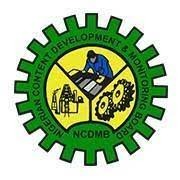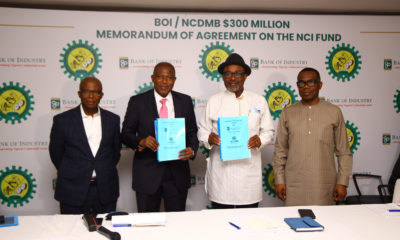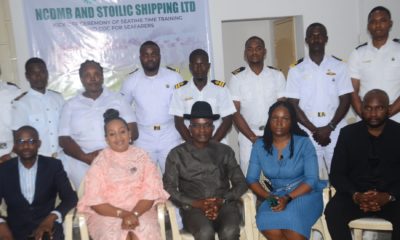Energy
NCDMB, NEXIM Bank sign deal on US$30m Working Capital Fund for Oil Firms

Precious ADELOLA
ABUJA-THE Nigerian Content Development and Monitoring Board (NCDMB) and Nexim Nigerian Export-Import Bank on Wednesday in Abuja signed a memorandum of understanding on the administration of US$30 million Working Capital Fund for oil and gas service companies.
The Fund was conceived by the NCDMB to support the operations of local oil companies against the adverse effects of COVID-19 Pandemic, loss of contracts due to low oil price and ensure the companies retain their personnel in employment.
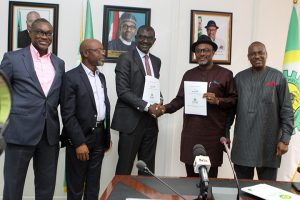
Chairman of Petroleum Technology Association of Nigeria, Mr. Nicolas Odinuwe; Managing Director, Nexim Nigerian Export-Import Bank, Mr. Abubakar Bello; Executive Secretary, Nigerian Content Development and Monitoring Board, Engr. Simbi Kesiye Wabote and President Oil and Gas Trainers Association of Nigeria, Mazi Sam Azoka Onyechi at the signing of a memorandum of understanding on the administration of US$30 million Working Capital Fund for oil and gas service companies
The Working Capital Scheme is one of the newly introduced products in the Nigerian Content Intervention Fund (NCI Fund) approved by the NCDMB Governing Council under the leadership of the Minister of State for Petroleum Resources, Chief Timipre Sylva.
Target beneficiaries include members of the Petroleum Technology Association of Nigeria (PETAN) and Oil and Gas Trainers Association of Nigeria (OGTAN) that are commercially viable with a business relationship with either an International Oil Company or major Nigerian Oil Company.
Giving details of the Fund, the Executive Secretary of NCDMB, Engr. Simbi Kesiye Wabote stated that the roll-out date is July 1, 2021, and Nexim Nigerian Export-Import Bank would provide matching funds of the same amount in Naira.
He said “the scheme would cover loans for working capital support and capacity building, invoice discounting and capacity building, including acquisition of low-end equipment to service short-term contracts/service obligations.”
The Executive Secretary also explained that the maximum amount that can be borrowed by a single obligor is US$1,000,000 or its Naira equivalent, while the tenor of the loan would be up to 12 months for Working Capital loans and up to 3 years for Capacity Building loans with moratorium of up to 12 months.
“The applicable interest rate shall be 5 percent per annum all-in for Dollar-denominated loans and 8 percent all-in per annum for Naira-denominated loans and the rate shall be fixed throughout the tenor of the loan. Maximum processing time shall be 21 working days from the date the applicant has provided all required documentation,” he added.
He also confirmed that ”all applications for the fund shall be through the web and NEXIM shall develop and avail a dedicated portal to facilitate the process, with access given to designated NCDMB staff for monitoring and necessary functions.”
Transactions that are eligible for funding support include those connected with oil service contracts, projects or contracts that boost the operations and viability of a qualifying service providers and transactions for the supply of low-end assets or other equipment for the execution of an oil service contracts from IOCs/ major NOCs.
Wabote clarified that the Board’s Fund arrangement with the Bank of Industry would continue. He said: Our intervention with the Bank of Industry is very successful. We audit the process periodically and we have 98 percent compliance in terms of pay back of the loan by creditors.”
In his comments, the Managing Director of Nexim Nigerian Export-Import Bank, Mr. Abubakar Bello explained that the financial institution was collaborating with NCDMB with a goal to support local service companies to export their services outside the country.
He said: “As the oil and gas industry in other African countries open, the capacities that have been built over time in the Nigerian oil and gas sector can be exported to other African countries and even outside Africa.
“We are going to support the development of capacities of indigenous servicing providers to be able to take them to other oil economies. Since services provide over 15 percent of Nigeria’s Gross Domestic Product (GDP), we should be able to delve into other climes.”
Energy
Asharami Synergy Unveils Fuelling Solutions In Omagwa
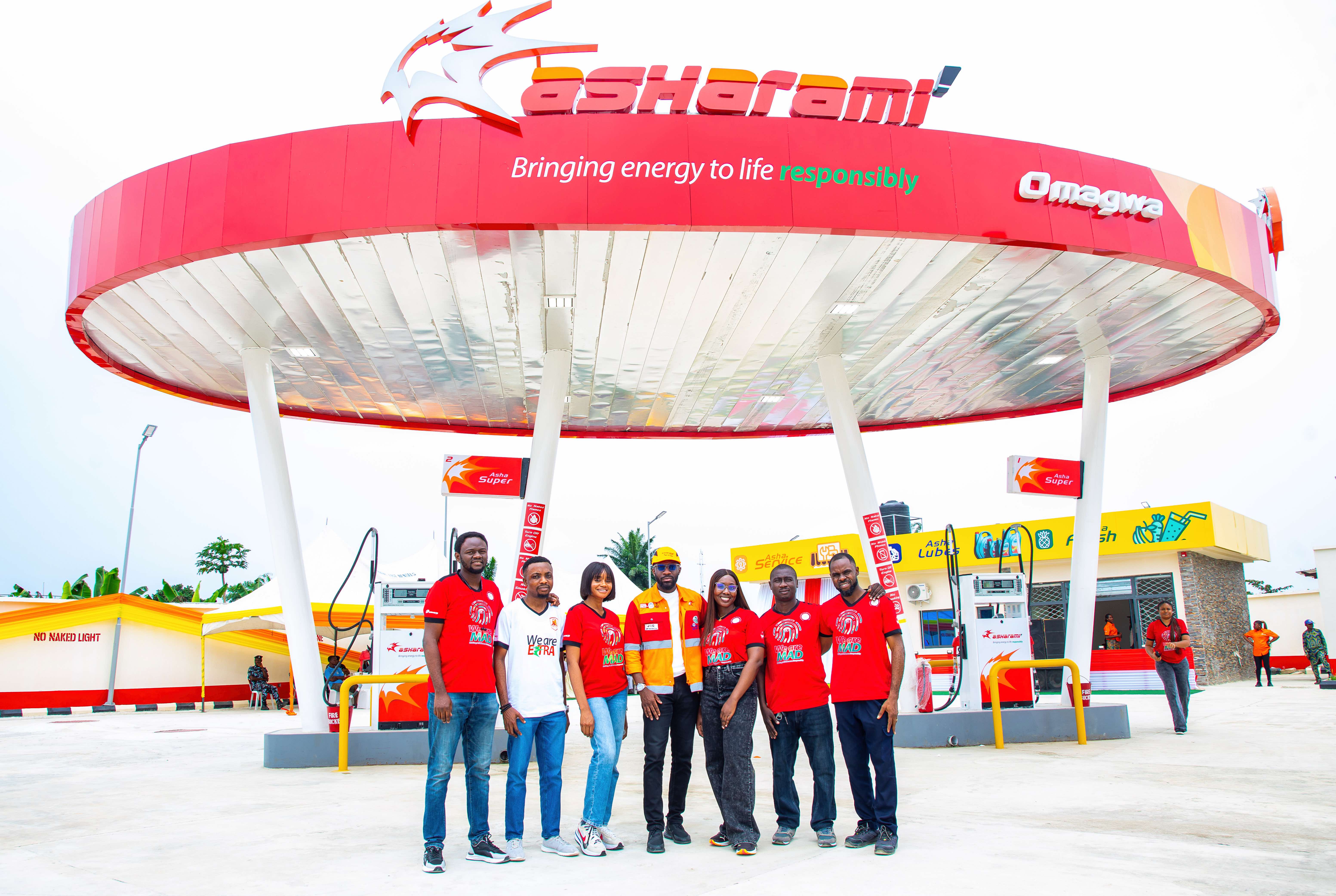
In line with its commitment to driving access to quality petroleum products, Asharami Synergy Limited, a leading Sahara Group downstream company, has said the public can now access exceptional fuelling solutions at its newly commissioned retail station in Omagwa, Rivers State.
Situated strategically along the Airport Road in Omagwa, the station, which features a storage capacity of 45,000 litres each for Automotive Gas Oil (AGO, also known as diesel) and Premium Motor Spirit (PMS, also known as petrol) is equipped with two pumps and four discharge nozzles for PMS and AGO.
The facility also has ample space for sundry services in a bid to ensure consumers get more “miles and smiles” as well as the energy to “go further” with Asharami’s world-class products.
“The Asharami Omagwa Retail Station is fully operational, offering a range of premium products and services. It’s a one-stop shop that also gives our esteemed customers eat-in and take-out restaurant services, shopping, as well as the Asha lubricants and Asha Service experience which will ensure premium care for all classes of automobiles and engines,” said Oladimeji Williams, Head, Government Relations and Business Development at Asharami Synergy.
ALSO READ: NNPCL Launches Utapate Crude Oil Blend, Eyes Production Expansion In 2025
At the Commissioning, Willaims said the new station represents an important step in Asharami Synergy’s expansion plan aimed at reaching and serving more communities responsibly. “This station is strategically positioned close to the airport, serving as the gateway for powering socio-economic development in the community and those close to it, while enabling Asharami Synergy integrate all aspects of its downstream business towards ensuring efficiency and value for our customers,” he stated.
Williams commended the Federal Airport Authority of Nigeria (FAAN) and the Omagwa community leaders for their support and collaboration throughout the project’s duration, describing it as a “seamless and productive process that highlights Asharami’s corporate stewardship and social impact” in the community.
Similarly, Ifesinachi Ezike, Regional General Manager (South South), FAAN, emphasized the broader significance of the new station, stating, “This occasion marks a significant milestone not just for Asharami Synergy but for the airport and the entire community. It marks not just an opening of a new facility but the beginning of a renewed commitment to enhancing the travel experience of all our passengers and stakeholders”.
In a move that underscores its commitment to sustainability and community development, Asharami Synergy also commissioned a solar-powered borehole during the launch. The borehole is set to improve access to clean and reliable water for residents, marking a tangible contribution to the local community.
“At Sahara, we are always making a difference—not just through our business operations; we are unwavering in our commitment to driving sustainable development and building partnerships that enhance the well-being of our host communities,” Williams added.
Energy
Awards Galore For Shell, Staff At NAPE 2024 Conference

The Shell companies in Nigeria and staff won awards in recognition of their robust participation at the 42nd Annual International Conference and Exhibition of the National Association of Petroleum Explorationists (NAPE), held in Lagos.
At the closing dinner of the event, the Managing Director of Shell Nigeria Exploration and Production Company (SNEPCo), Ronald Adams pledged sustained efforts by the company to address “the Nigerian energy trilemma by powering progress towards energy security in a sustainable manner”.
On the awards, the Shell was declared Best Overall Exhibitor and Best Exhibiting Energy company (International) just as Geophysicist Somime Oguntola took home the Award of Excellence for Oral Paper (second place).
The icing on the cake was a Shell staff, Johnbosco Uche, being installed as the new President of the NAPE.
It was gathered that the Shell companies in Nigeria have supported NAPE since its founding in 1975, using the skills and expertise of the large pool of energy professionals in its employment to improve its activities especially educational and mentoring programmes.
In addition to being a major sponsor of the 2024 conference, Shell mounted a high-profile exhibition, featuring among other things, career counselling, engagements on Nigerian Content and Contractor development and panel sessions on Women in Industry and Sustainability Energy Challenge.
A highlight was the Shell medical stand which attended to more than more than 500 conference participants and members of the public over the four days of the annual event. The doctors and nurses offered a wide range of services including laboratory tests, deworming, medical consultation as well as ophthalmology checks and distribution of nearly 300 eyeglasses.
Adams referred to the operations of SNEPCo as an example of Shell’s contribution to energy security in Nigeria. “As a result of sustained production from Bonga, we have provided funds to finance development, created a new generation of Nigerian Deepwater professionals, empowered indigenous contractors and service providers, and implemented social investments that have touched lives in the six geo-political zones of the country,” he said.
Adams added, “SNEPCo and indeed Shell are in Nigeria for the long haul. Our commitment is reflected in both our current and growth plans, all of which are grounded in principles of safety, affordability, and competitive performance.”
Energy
Accugas Denies Culpability In Akwa Ibom’s Power Outage

Owing to the persistent power outage, which has crippled economic and social life in most parts of Akwa Ibom State and environs, Accugas Limited has washed its hands off the ugly situation.
This was contained in a statement under the signature of its Communications Manager, Okwudili Onyia, in which the company traced the anomaly to a “fault in the 132-KV Aba-Itu transmission line”.
To ameliorate the situation, the company maintained that “It is imperative that the restoration of the Aba-Itu line is completed as soon as possible.”
In addition, the company pledged thus, “Accugas will continue to partner with, and support, the government of Akwa Ibom State towards achieving the government’s agenda for economic development and prosperity of the state.”
ALSO READ: NNPC Ltd To Supply 100mmscf/d Gas To Dangote Refinery
The statement reads, “Accugas Limited, a subsidiary of Savannah Energy, wishes to strongly deny the misinformation concerning its alleged involvement in the current power outage in Akwa Ibom State.
“The power cut in Akwa Ibom State is entirely due to the reported fault in the 132-KV Aba-Itu transmission line, which, unfortunately, is preventing power being transmitted from the National Grid into the State. It is imperative that the restoration of the Aba-Itu line is completed as soon as possible.
“Ibom Power Company (“IPC”) is one of 23 thermal power generation companies which channel power to the National Grid, which in turn disseminates all accumulated power to each State of the Federation through the electricity distribution companies (“Discos”). Indeed, Accugas supplies gas to enable c. 20% of Nigeria’s thermal generation capacity and, as such, is a critical enabler of the Nigerian economy.
“Within Akwa Ibom State, Accugas has been the sole supplier of gas to IPC since 2014 and, together with other Savannah subsidiaries, has invested over US$1.5 billion in gas development within the state. Furthermore, Savannah has recently invested c. US$45 million in a gas compression project at Accugas’ Uquo central processing facility at Esit Eket. Accugas’ commitments also extend to several social investment projects in the state. All the foregoing investments and projects, including other imminent investments Accugas intends to make in the State, demonstrate the Company’s long-term commitment to Akwa Ibom State and Nigeria.
“Accugas will continue to partner with, and support, the government of Akwa Ibom State towards achieving the government’s agenda for economic development and prosperity of the state.”



